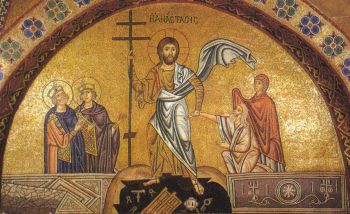Resurrection

In this depiction, Christ first appears in the realm of the dead, awaited by Old Testament kings, presumably David and Solomon, overcomes death, shatters the gate to the realm of the dead beneath his feet and grasps the arm of the kneeling old Adam, behind whom Eve can be seen in a posture of prayer.
The resurrection (Greek: αναστασις anastasis ; Latin: resurrectio; German: Auferstehung) of the body or the resurrection of the dead (Latin: resurrectio mortuorum) means the reunion of the immortal spirit or the immortal part of the soul, previously separated from the body by death, with the now restored but no longer decomposed body. Through the resurrection, the incorruptibility or regeneration of the bodily form and thus the bodily, mental and spiritual integrity of the human being is guaranteed. This is also referred to in the famous quote by Friedrich Christoph Oetinger (1702-1782): "Corporeality is the end of the works of God".
Historical background
For the Hellenistic world, the immortality of the soul was predominantly the focus of interest, mainly in connection with Plato, and similarly for Gnosticism, which saw corporeality as the source of all evil. The idea of resurrection, on the other hand, is firmly rooted in Zoroastrianism and in the great monotheistic Abrahamic religions (Judaism, Christianity, Islam). For example, Isaiah states:
„19 Your dead shall live, the dead bodies shall rise again; he who lies in the earth shall awake and rejoice. For the dew you send is a dew of light; the earth gives up the dead.“
And in the last revelation to Daniel:
„1 In those days Michael, the great prince of angels, will arise to intercede for the sons of your people. Then comes a time of trouble, such as has not been since there were nations, until that time. But thy people shall be saved in that time, every one that is written in the book. 2 Of those who sleep in the land of dust, many will awake, some to eternal life, others to shame, to everlasting abhorrence. 3 The wise will shine as the heavens shine; and the men who have led many to do right will shine forever and ever like the stars [...] 13 But you now go to the end! You will rest, and at the end of days you will rise to receive your inheritance.“
Literature
- Romano Guardini: Die letzten Dinge: Die christliche Lehre vom Tode, der Läuterung nach dem Tode, Auferstehung, Gericht und Ewigkeit, Topos Verlag 2008 (1. Aufl. 1952), ISBN 978-3836704618
- Oscar Cullmann: Unsterblichkeit der Seele oder Auferstehung der Toten?, Kreuz-Verlag 1962
- Gisbert Greshake: Tod - und dann? Ende - Reinkarnation - Auferstehung; der Streit der Hoffnungen. Herder, Freiburg im Breisgau / Basel / Wien 1988, ISBN 3-451-08504-6
- Gisbert Greshake, Gerhard Lohfink: Naherwartung, Auferstehung, Unsterblichkeit: Untersuchungen zur christlichen Eschatologie. Herder, Freiburg im Breisgau / Basel / Wien 1975 ISBN 978-3451020711
- Gisbert Greshake, Jacob Kremer: Resurrectio mortuorum: zum theologischen Verständnis der leiblichen Auferstehung. WBG, Darmstadt 1986, ISBN 3-534-07037-2
- Benedikt XVI./Joseph Ratzinger: Eschatologie - Tod und ewiges Leben, 2. Aufl., Verlag Friedrich Pustet, Regensburg 2012, ISBN 978-3791720708
- Emil Bock: Das Evangelium, Urachhaus Verlag, Stuttgart 1984
- Homer: Ilias und Odyssee, Deutsch von Johann Heinrich Voss, Rheingauer Verlagsgesellschaft, Eltville am Rhein, 1980, S 651
- Pierre Teilhard de Chardin: Das Herz der Materie, Walter Verlag, Olten 1990
- Sergej O. Prokofieff: Das Mysterium der Auferstehung im Lichte der Anthroposophie, Verlag Freies Geistesleben, Stuttgart 2016, ISBN 978-3772519116
- Sergej O. Prokofieff: Und die Erde wird zur Sonne: Zum Mysterium der Auferstehung, Verlag des Ita Wegman Instituts 2012, ISBN 978-3905919431
- Frank Linde: Auferstehung: Band 1 und 2: Die Auferstehung im Werk Rudolf Steiners Band 3: Zeitreisen und Phantom - Eine kritische Analyse, Edition Kunstschrift im Residenz Verlag, Wien 2015, ISBN 978-3990530016
- Rudolf Steiner: Die Welträtsel und die Anthroposophie, GA 54 (1983), ISBN 3-7274-0540-6 English: rsarchive.org German: pdf pdf(2) html mobi epub archive.org
- Rudolf Steiner: Die Apokalypse des Johannes, GA 104 (1985), ISBN 3-7274-1040-X English: rsarchive.org German: pdf pdf(2) html mobi epub archive.org
- Rudolf Steiner: Aus der Bilderschrift der Apokalypse des Johannes, GA 104a (1991), ISBN 3-7274-1045-0 English: rsarchive.org German: pdf pdf(2) html mobi epub archive.org
- Rudolf Steiner: Das esoterische Christentum und die geistige Führung der Menschheit, GA 130 (1995), ISBN 3-7274-1300-X English: rsarchive.org German: pdf pdf(2) html mobi epub archive.org
- Rudolf Steiner: Von Jesus zu Christus, GA 131 (1988) English: rsarchive.org German: pdf pdf(2) html mobi epub archive.org
- Rudolf Steiner: Die Welt der Sinne und die Welt des Geistes, GA 134 (1990) English: rsarchive.org German: pdf pdf(2) html mobi epub archive.org
- Rudolf Steiner: Christus und die menschliche Seele, GA 155 (1994), ISBN 3-7274-1550-9 English: rsarchive.org German: pdf pdf(2) html mobi epub archive.org
- Rudolf Steiner: Bausteine zu einer Erkenntnis des Mysteriums von Golgatha, GA 175 (1996) English: rsarchive.org German: pdf pdf(2) html mobi epub archive.org
 |
References to the work of Rudolf Steiner follow Rudolf Steiner's Collected Works (CW or GA), Rudolf Steiner Verlag, Dornach/Switzerland, unless otherwise stated.
Email: verlag@steinerverlag.com URL: www.steinerverlag.com. Index to the Complete Works of Rudolf Steiner - Aelzina Books A complete list by Volume Number and a full list of known English translations you may also find at Rudolf Steiner's Collected Works Rudolf Steiner Archive - The largest online collection of Rudolf Steiner's books, lectures and articles in English. Rudolf Steiner Audio - Recorded and Read by Dale Brunsvold steinerbooks.org - Anthroposophic Press Inc. (USA) Rudolf Steiner Handbook - Christian Karl's proven standard work for orientation in Rudolf Steiner's Collected Works for free download as PDF. |
